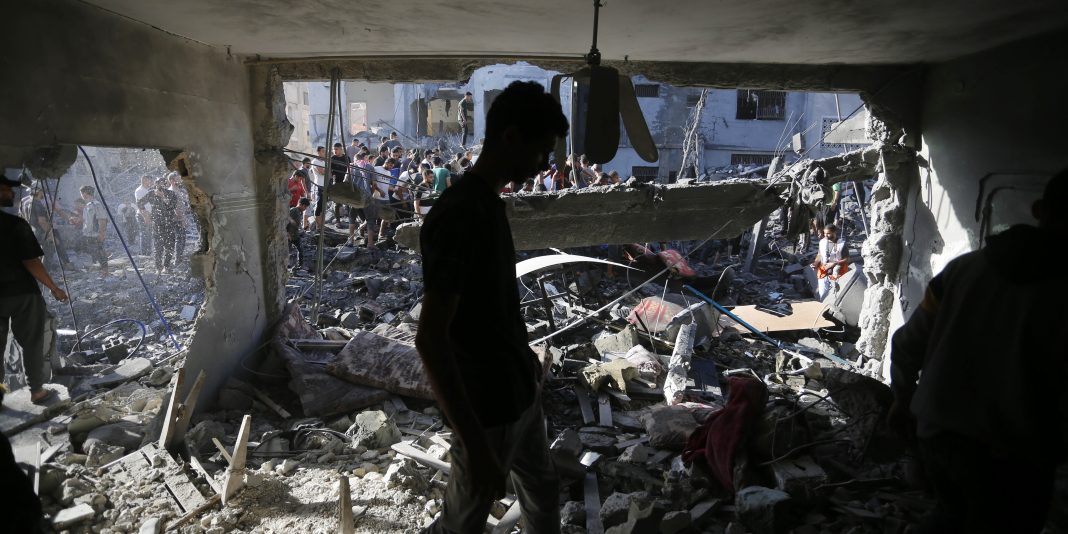The International Court of Justice (ICJ) recently issued a ruling that supports what Palestinian advocates have been saying for decades: Israel’s occupation of Palestinian land, including its settlements in the West Bank, is illegal and must come to an end. This advisory opinion from the top court also called for reparations for Palestinians who have lived under Israel’s occupation since 1967, marking an unprecedented step for the ICJ. The court further declared Israel’s mistreatment of Palestinians as a form of segregation and apartheid, and it upheld the Palestinians’ right to self-determination.
This ruling has the potential to shift the international community’s ability to push for Palestinian statehood, according to Jessica Peake, an international law professor at UCLA Law. She expressed surprise at the court’s finding that Israel is creating a situation of apartheid against Palestinians within its borders. Peake highlighted the racially discriminatory laws and policies that treat Palestinians as second-class citizens.
However, not all advocates for Palestinians living within the occupied territories are enthusiastic about the ruling. Eitay Mack, an Israeli attorney and advocate for Palestinians in the West Bank, believes that the ruling does little to immediately change the reality for Palestinians. He mentioned receiving reports of Israeli settlers attacking Palestinians in the West Bank while the ICJ officials read out their ruling. Mack emphasized that implementing a two-state solution that gives Palestine sovereignty requires political will from both Israelis and Palestinians.
To understand the context, it is important to note that Israel began its occupation of the West Bank and Gaza, along with annexing East Jerusalem, during the 1967 Arab-Israeli War. Subsequently, Israel established settlements inside the occupied territories, supporting Israeli civilians as they built communities on land taken from Palestinians. Although Israel withdrew its troops and settlements from Gaza in 2005, it continued expanding settlements in the West Bank. In recent months, Prime Minister Benjamin Netanyahu’s far-right government has used its war in Gaza as an opportunity to accelerate settlement expansion.
Unsurprisingly, the Israeli government dismissed the ICJ ruling. Netanyahu defiantly referred to Jerusalem as “our eternal capital” and the West Bank as “the land of our ancestors,” using biblical names. He stated that no decision from The Hague could distort the historical truth or challenge the legality of Israeli settlements in all territories of their homeland.
B’Tselem, an Israeli-based human rights group, welcomed the ICJ ruling after years of advocating for an end to Israel’s occupation. They criticized the international community for accepting Israel’s claim that its occupation is temporary and engaged in negotiations and diplomacy. B’Tselem called on the international community to use every tool available, including criminal, diplomatic, and economic means, to pressure Israeli decision-makers into ending the occupation.
In recent months, more nations have officially recognized Palestine as a state, with Norway, Spain, and Ireland joining 143 others. The ICJ ruling, which declares Israel’s occupation an obstacle to Palestinian statehood, may encourage more nations to follow suit. However, in April, the U.S. vetoed a measure in the U.N. Security Council that would have recognized Palestine as a member of the U.N., insisting that Palestinian statehood can only come from direct negotiations between Palestine and Israel. The United States provides billions of dollars in military aid to Israel annually.
Israel argued that the ICJ ruling would interfere with ongoing negotiations and passed a resolution rejecting Palestinian statehood. However, Peake believes that the ICJ decision undercuts this notion and provides legal backing for states to recognize Palestine, insulating them from political pressure from the United States and Israel.
While the U.N. has previously issued declarations condemning Israeli occupation, most of these were issued by U.N. bodies specifically addressing Palestine. This ICJ ruling is significant because it represents strong language about the occupation backed by the majority of U.N. membership. Peake acknowledges that the ruling may not bring immediate change, but she hopes it provides stronger tools for states and the international community to address the situation in occupied Palestine.

